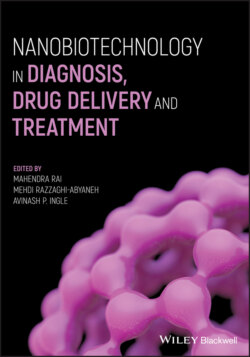Читать книгу Nanobiotechnology in Diagnosis, Drug Delivery and Treatment - Группа авторов - Страница 33
1.3.2.2 Cancer
ОглавлениеPorous silica nanoparticles have emerged as an efficient delivery system for cancer therapy. Targeted drug therapy requires zero release before reaching the target site (Bharti et al. 2015). Targeted delivery of Doxorubicin (DOX) using silica nanoparticles coated with PEG have been reported. For the study, 120 mg kg−1 of nanoparticles were injected on a weekly basis for a period of three weeks to a KB‐31 xenograft model. The results of the study showed 85% inhibition of tumor by DOX‐loaded silica nanoparticles in comparison to DOX drug. A study reported curcumin‐containing liposomes conjugated with synthetic RNA aptamer (Apt‐CUR‐NPs) to target epithelial cell adhesion molecule (EpCAM) protein which is observed in colorectal adenocarcinoma. The Apt‐CUR‐NPs depicted enhanced bioactivity of curcumin (CUR) after 24 hours compared to free CUR. Apt‐CUR‐NPs also showed increased binding to HT29 colon cancer cells and cellular uptake. Comparative study of in vitro induced cytotoxicity of free CUR and Apt‐CUR‐NPs in HT29 cell line demonstrated more cytotoxicity of Apt‐CUR‐NPs in comparison to totally free CUR (cellular viabilities about 58% and 72%, respectively) (Rabiee et al. 2018).
